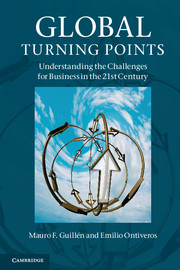Book contents
- Frontmatter
- Contents
- Illustrations
- Tables
- Preface
- 1 Welcome to the twenty-first century
- 2 A global economy out of balance
- 3 The rise of the emerging-market multinationals
- 4 The new demography
- 5 From dictatorship to democracy and failed states
- 6 A disparate world
- 7 The quest for sustainability
- 8 The global powers of the twenty-first century
- 9 Coping with uncertainty and complexity
- References
- Index
1 - Welcome to the twenty-first century
- Frontmatter
- Contents
- Illustrations
- Tables
- Preface
- 1 Welcome to the twenty-first century
- 2 A global economy out of balance
- 3 The rise of the emerging-market multinationals
- 4 The new demography
- 5 From dictatorship to democracy and failed states
- 6 A disparate world
- 7 The quest for sustainability
- 8 The global powers of the twenty-first century
- 9 Coping with uncertainty and complexity
- References
- Index
Summary
In 2001, two momentous events shook the world. On September 11 a small group of bold terrorists mounted a series of daring attacks on the United States, and on September 17 the World Trade Organization concluded its 15-year-old membership negotiations with China. Although the world’s preeminent geopolitical power had been the target of other terrorist attacks during the preceding decade, 9/11 was qualitatively different not only because of the large number of victims but also because it undermined the country’s sense of security. Likewise, China’s economic and financial rise had been in the making since the 1980s, but it was not until the early 2000s that the world came to the realization that Earth’s most populous country would one day also become the largest economy, and that it was already the world’s largest exporter and the second largest importer. Chinese exports, trade surpluses, and currency reserves soared, with the US reaching record deficits in its current account. These global imbalances set the stage for the most severe global economic and financial crisis in decades.
Welcome to the twenty-first century. The new centennial is not even a teenager and it has already developed its own, unique personality. This book deals with the challenges facing us in the new century. It is not one more exercise at projecting past trends into the future, but an analysis of the major global turning points confronting us, namely, the game-changing events and trends that are transforming the world beyond recognition.
Information
- Type
- Chapter
- Information
- Global Turning PointsUnderstanding the Challenges for Business in the 21st Century, pp. 1 - 7Publisher: Cambridge University PressPrint publication year: 2012
